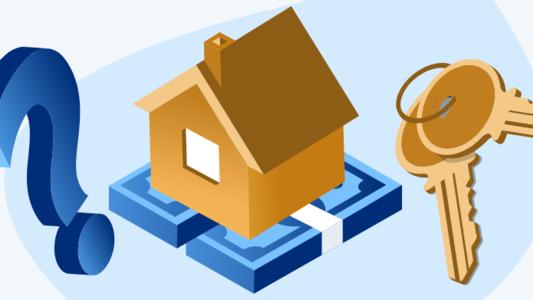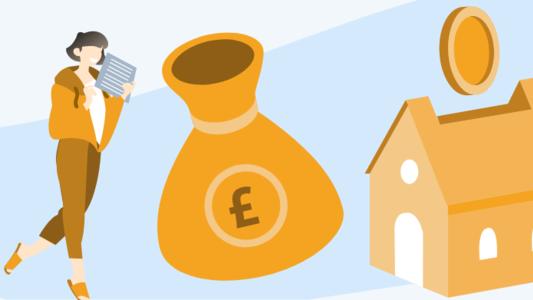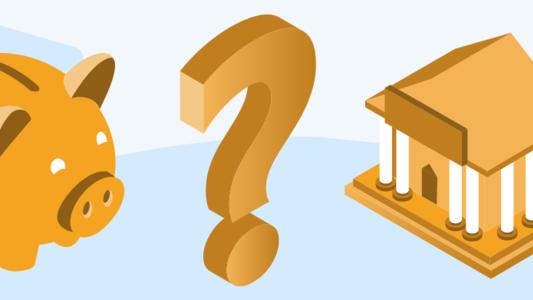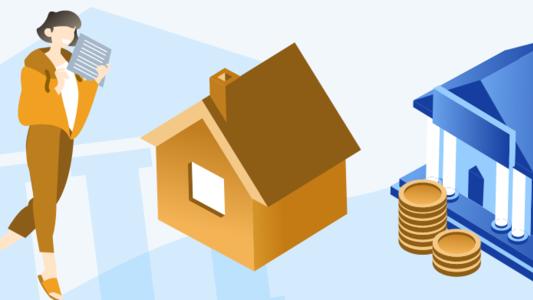Types of Mortgage: How Does a Mortgage Work?

Getting a mortgage is an essential part of buying a house, whether for the first time or if you’re looking to buy a new property. Although it seems like there should just be one type of mortgage, there are many different options to choose from based on your finances and even your religious beliefs. In our comprehensive guide, we walk you through the different types of mortgage on offer and how they work!

What Is a Mortgage?
A mortgage is a large long-term loan provided by banks or other lenders. Mortgages have been around for a long time, but they really took off in the UK during the 1970s with building societies - to this date the UK’s last building society Nationwide is the country’s biggest mortgage lender.
Since the upfront cost of a property is typically much higher than most people have in savings, a mortgage is used to buy the property by providing the majority of the value of the house. Although mortgages are used for this and are part of the housing market, you can use a mortgage to finance other purchases.

How Does a Mortgage Work?
Once you find the house of your dreams and have negotiated a price for it, you’ll more than likely need a mortgage loan to be able to pay for it upfront. Your mortgage lender will give you a loan to pay for the majority of the house’s value and you will have to pay for the rest by putting down a deposit.
Once you’ve bought your house with your deposit plus mortgage, you will then have an outstanding debt with your mortgage lender that you will need to pay off. To make it profitable for your mortgage lender, they will put an interest rate on your loan meaning that the amount you pay will be a lot more than you have borrowed.
Since your outstanding balance with your mortgage will be a very large amount, you are given a long time to pay it back. At the moment, the standard time given is 25 years, but this can even be 30 to 35 years. In fact, in the UK there was a recent proposal for 50-year mortgages, reported in the Guardian!
What’s Freehold and Leasehold? In the UK housing market, there are generally two types of property you can buy: freehold and leasehold. A freehold property is where you own both the land and the building that you live in as a whole and you take responsibility for its maintenance. Another option is buying a leasehold property, where you own the property for a limited (but often long) length of time.
Check out our Freehold vs. Leasehold guide!

What Are the Main Parts of a Mortgage?
A mortgage will typically include three main parts to it between the borrower and the lender. All these parts allow for a mortgage both to finance the cost of the home for the borrower and for the mortgage lender to make a profit. Let’s a look at some of the mortgage terminology that used when talking about the loan:
- Loan-to-value
The loan-to-value is used to describe how much your lender gives you as a ratio of your home. For example, if the home you want is 100,000 and your lender gives you 90,000 as a loan, this is a 90% loan-to-value. The higher the loan-to-value, the more you’re given to finance your home purchase. - Deposit
The deposit is the amount you put down as an upfront payment for the property. It’s the opposite of the loan-to-value and you’ll need to have this ready to be able to take out the rest of the loan. Deposits can range from 5% for first-time home buyers to 25% for buying a second home. - Interest Rate
The interest rate applied to your loan to compensate your lender for taking on the risk of lending to you. These rates can be small, but it really depends on your credit score and what your lender is willing to offer you!
Mortgage Example To give you an overview of how a simple mortgage works, here’s an example. Say you have found your dream home and you have agreed to pay £200,000 for it. You have £28,000 in your savings account so you will need a mortgage to pay for the house.
You go to your mortgage lender and they agree to give you 90% of the cost of the house so you can buy it, but they want you to put the other 10% as a deposit. So in the end you pay £20,000 for the deposit and the bank gives you the remaining £180,000 as a loan.
Your bank decides to give you 25 years to pay off the loan and say that they want to charge you 3% on the £180,000 loan. This means that over those 25 years, you will pay back a total of £256,074.11 with the interest included.
This total you will pay back in monthly instalments, meaning that over 25 years, you will be paying a fixed-rate of £853.58 a month.

What Can Affect a Mortgage?
There are also many factors that can affect your mortgage over time. Since it is a loan that you must pay back, you need to be careful before altering the terms of the mortgage in any way and you need to make sure you make your repayments every month.
What Happens If I Don’t Pay My Mortgage?
Not paying your mortgage can have serious repercussions on your home and also your credit score. Missing a mortgage repayment is known as a mortgage delinquency, where you have failed to pay on time or are late with your repayment. Mortgage delinquencies can have different reactions from different lenders, but the most common is for the bank to repossess your home.
What happened in 2008? The financial crash in 2008 had a lot to do with mortgages and mortgage delinquencies. Before 2008, mortgage lenders were lending very liberally to people (sometimes as 100% loan-to-value!) without properly checking their ability to pay back the loan.
In the end, the subprime mortgage crisis was caused by a surge in mortgage delinquencies and people failing to make their payments. This then triggered global financial prices and a housing market crash.
Since 2008, mortgage lenders have been very cautious about lending, and often require a very large deposit before you can take out a loan.
Can I Renegotiate My Mortgage?
You will usually be able to renegotiate your mortgage terms further down the line but this of course depends on the type of mortgage you have taken out and if you’ve been repaying on time. Renegotiating the terms of your mortgage is known as remortgaging.

What Is Mortgage Overpayment?
Since mortgage payments are worked out to the last penny, paying more on your mortgage can affect your entire loan. You can make your overpayments in one of two ways: either you can pay a one-off lump sum or you can make regular overpayments each month.
Overpayments can help you reduce your overall balance you end up paying in the end, but you should be careful to double check the terms and conditions on your mortgage before making a repayment. Since it could affect the amount you pay, you might be charged with a fee for making the overpayment!
What Are Mortgage Rates in the UK Like?
The Bank of England has announced interest rate rises for the first time in decades, meaning that those who have been on variable mortgages will face an issue with repayments rising.

How Do Mortgage Rates Work?
Currently in the UK, mortgage rates are determined on a hybrid basis. This means lenders offer a fixed rate for a period of time, which then turns into a variable rate after the end of the fixed period. Almost all lenders offer a 2-year fixed-rate as a basic offer, but some have 5-year and even 10-year fixed offers!
In order to compare the rates effectively, the Annual Percentage Rate of Change (APRC) is used to calculate how your mortgage rates add up overall. This is a useful number as it allows you to compare the different rates over the full term of the mortgage.
| Lender | Fixed-Rate | Variable-Rate | APRC |
|---|---|---|---|
| Nationwide Mortgage Rates | 3.44% | 4.49% | 4.4% |
| HSBC Mortgage Rates | 3.39% | 4.29% | 4.2% |
| Santander Mortgage Rates | 3.89% | 4.50% | 4.3% |
| Halifax Mortgage Rates | 3.38% | 4.49% | 4.5% |
| Natwest Mortgage Rates | 2.64% | 4.49% | 4.3% |
Based on a 90% loan-to-value on a £180,000 loan for 25 years on a 2-year fixed-rate.
Last updated: 07/07/2022.
The rates you are offered will ultimately depend on you and your financial position. If you are a first-time buyer, you will probably have other Help-To-Buy offers out there that can help you take out your mortgage more easily. If you’re a second time buyer or looking to remortgage, you should shop around to see which lender offers the best rates for your situation.
Check out our Mortgage Calculator!
What Types of Mortgage Are There?
Mortgages are similar to any other product on the market. There’s a lot of variety catered towards different financial situations, different needs, and even different religious beliefs!

Why Are There Different Types of Mortgage?
There are many reasons for the different types of mortgages you can find. As a mortgage is made up of different parts, these parts can vary depending on the borrow and what the lender is willing to offer. The interest rate could be fixed or variable or the loan-to-value can be higher or lower. Whatever it is, more mortgage variety allows for greater choice amongst borrowers!
Types of Mortgages
Here’s a list of the different types of mortgage you can get along with their pros and cons:
| Type of Mortgage | Main Features | Pros | Cons |
|---|---|---|---|
| Fixed-Rate | Fixed-rate mortgage allows you to lock in your interest rate. This can provide a lot of certainty about your repayments and will stop them from fluctuating. | Certainty Same rate for a period of time Not affected by interest rate rises |
Expensive to leave fixed period Can’t benefit from lowered interest rates Higher deposit required |
| Variable-Rate | Variable-rate mortgage means your repayments vary with interest rates rising and falling. This means you can pay more one year and less another. | Benefit from lowered interest rates Cheaper deposits Lower leaving costs |
Affected by higher interest rates Less certainty Riskier for the borrower |
| Tracker | A Tracker mortgage tracks the Bank of England’s interest rate plus a few percentage points. This means your repayments will fluctuate month to month according to the rates. | Benefit from lowered interest rates Rates follow the economy |
Affected by higher interest rates Less certainty |
| Capped-Rate | A Capped-Rate mortgage is a type of Variable-Rate that limits how high the interest rate can rise. | Benefit from lowered rates Not risk of repayments becoming more expensive |
Can’t benefit from rates falling below a floor. Rates can still rise. |
| 95% Mortgage | 95% mortgage allows for people who are struggling getting a deposit have a higher loan-to-value. | Lower deposit Easier for first-time buyers |
High risk of falling into negative equity Higher interest rate |
| Interest-Only | Interest-Only mortgages only charge you for the interest on the loan rather than together with the loan amount. You will pay the loan amount at the end of the loan period. | Cheaper monthly payments | Need to have the full amount of the loan ready to pay off at the end of the loan |
| Joint | A Joint mortgage allows for two or more people to take out a mortgage and share the liability of the loan. This is also useful for tenants in common agreements. | Cheaper for each individual person Allows you to buy a more expensive property |
Can cause very difficult problems if people in the joint mortgage want to split up. |
| Guarantor | A guarantor is someone who will pay your mortgage repayment if you miss a payment for one month. | Security for both you and you lender that payments will be made | Legal issues can occur if the guarantor doesn’t pay. |
| Islamic | Islamic mortgages are a halal way for Muslims to be able to purchase a home without having to pay interest, which is haram. The home is purchased by the bank and the occupant pays rent until ownership is transferred. | Halal way to finance a home No interest paid |
As a very niche product, only a few banks offer them |






